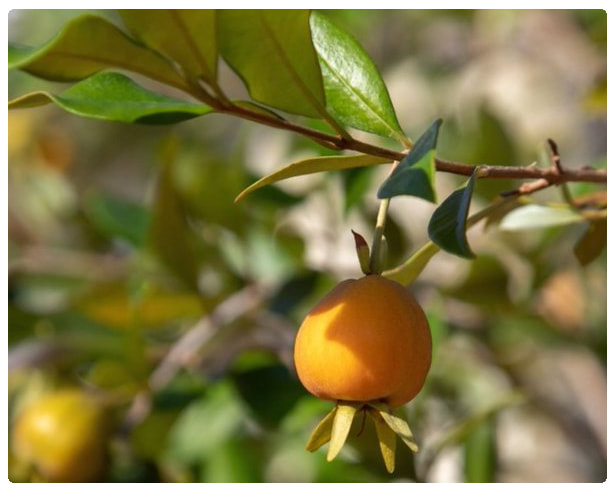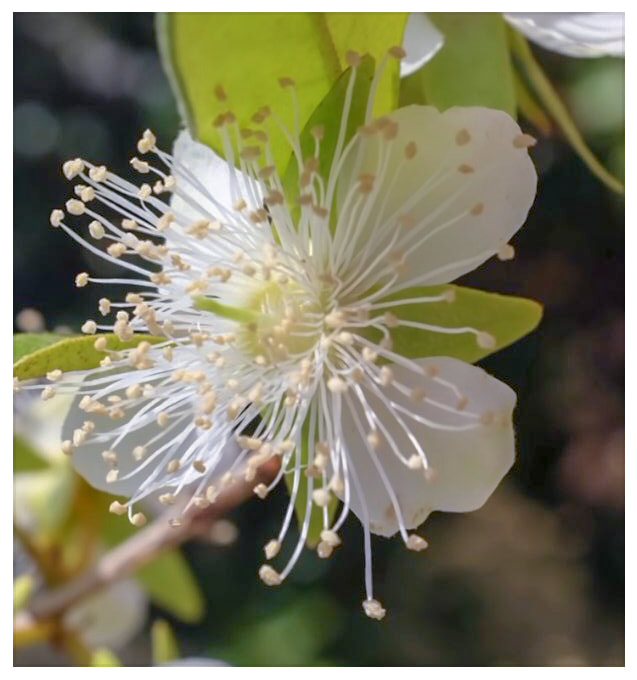- All Plants
- >
- Two Pitomba Seedling trees - Free USPS Priority Shipping
Two Pitomba Seedling trees - Free USPS Priority Shipping
Quality fruit trees, medicinal and edible plants. These starter plants come to you in larger nursery pots. You get a 3.5 x 8 inch pot instead of a tiny 1.5 x 1.5 potted plant. More plant for your money!
These trees are about 8 inches tall and should begin flowering in about 2-3 years.
Notice: Please don't order if you are experiencing temperatures below 50 degrees Fahrenheit. Not responsible for cold weather damage.
This order includes USPS Priority Shipping.
(2 day average delivery).
Pitomba (Eugenia luschnathiana) is a delicious sweet apricot flavored fruit similar in size and growth habit as a grumichama.
Description TWO PLANTS PER ORDER
This little-known species is native to the State of Bahia, Brazil.
The pitomba is an attractive, small tree that produces and abundance of yellow, aromatic, cherrylike fruit. However, it is rarely seen outside of collections. While the pitomba is not likely to achieve commercial status in Florida, it makes an excellent dooryard crop and is worth planting on a broader scale. The tree is easy to care for and is relatively free of problems. native to Brazil, Paraguay, and Argentina. It belongs to the Myrtaceae family, which includes other well-known plants such as guava and eucalyptus.
The tree can grow up to 10 meters tall, with a dense crown and a straight trunk. Its bark is smooth and reddish-brown in color, and its leaves are oval-shaped, glossy, and dark green. The tree produces small, white flowers with prominent yellow stamens that bloom in the spring and summer. These flowers are followed by round, red or dark purple fruits that are about 2-3 centimeters in diameter. The fruit is edible and has a sweet, juicy flavor, similar to that of a cherry.
Pitomba is often used in landscaping for its attractive foliage, flowers, and fruit, as well as for its tolerance to a variety of soils and environmental conditions. In addition, the fruit is widely consumed fresh, used in jams and jellies, and is also an ingredient in traditional medicines.
Flowers
Snowy white yellow flowers up to an inch and a half across are borne during the spring months and the fruit ripens about a month to six weeks later. Flower season is usually April through June.
Fruit
The fruit is broadly obovoid, about an inch long, with the apex crowned by 4 or 5 green sepals, about 1/2 inch long. The thin skin is a bright orange yellow. The soft, melting, juicy flesh is orange in color and aromatic, sweet to subacid in flavor. The fruit contains 1 to several seeds attached to one side of the seed cavity. The fruit matures from May to June and sometimes there is a light crop in the fall. The pitomba usually begins fruiting in about the third year after planting.
Planting
Trees grow over a wide variety of soils, but have less micronutrient problems under acidic conditions. If grown close to the coast usually they have excellent salt tolerance if in good condition nutritionally. Trees prefer sun for optimum fruiting, but will tolerate partial shade.
Irrigation
Your tree will require irrigation during establishment and during periods of drought.
More information
Rate of growth on most of these is about two feet or more a year, and they make excellent hedges where sufficient plants can be bought or accumulated. For people with limited growing space, pitombas make excellent container specimens and can grown and fruit quite well in seven-to-ten-gallon-sized containers.
Mature trees are quite cold hardy and survive to about 27°F without injury. Young plants will get injured at about 30°F.
Origin: South America
USDA hardiness zones: 9 b - 11
Uses: Food and medicine
Height: 15 ft (4.5 m)
Spread: 15 ft (4.5 m)
Plant habit: Low branching and bushy, with upturned limbs
Growth rate: Slow, trunk/bark/branches, small, upright tree.
Leaves: Evergreen; alternate, smooth, glossy dark green.
pH preference: 5.5-6.5
Roots: Shallow, fibrous root system; benefits from copious mulching
We offer quality, exotic fruit tree starter plants. We use only OMRI approved organic pesticides. Have a look at our offers and buy with confidence. See our reviews on our website. We work hard to bring you the finest plants and earn 5 stars. You can also learn to grow plants on our website. https://www.pepessplants.com
All seedling plants need protection from cold weather, wind, sun, dry conditions.
WE GUARANTEE LIVE DELIVERY. Message us along with a photo of the plant immediately upon arrival if the plants are in poor condition. We cannot guarantee plants that are no longer in our care. Many of our plants require warm temperatures. Shipping to areas that are cold will be at buyer's risk. We offer quality plants that are inspected and approved for shipment. Pepe's Plants will not be responsible for plants that die as a result of improper care and handling once it is in the buyers hands.
On arrival of your seedling put them in a place with temperatures about (70-80 F) in shade but NOT direct sun for two weeks so they can adjust from shipping. NO direct sunlight at all! NO partial shade - FULL SHADE ONLY! Once again: Sun will burn the seedlings! Allow the plants a week or two to adjust before transplanting or fertilizing. If you plan to plant them in the garden, gradually increase their exposure to sunlight and outdoor conditions!
* FDA Disclaimer
The products and statements made about specific plants or products on this web site have not been evaluated by the United States Food and Drug Administration (FDA) and are not intended to diagnose, treat, cure or prevent disease. All information provided on this web site or any information contained on or in any product label or packaging is for informational purposes only and is not intended as a substitute for advice from your physician or other health care professional. You should not use the information on this web site for diagnosis or treatment of any health problem. Always consult with a healthcare professional before starting any new vitamins, supplements, diet, or exercise program, before taking any medication, or if you have or suspect you might have a health problem.








